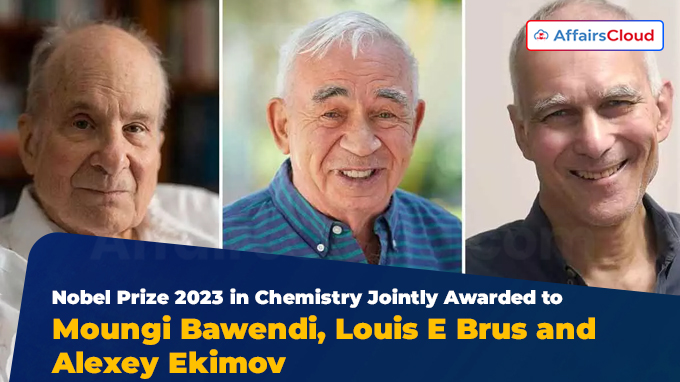
- The Nobel Prize in Chemistry was awarded by the Royal Swedish Academy of Sciences, Stockholm, Sweden.
Winners of the Nobel Prize in Chemistry 2023:
| Nobel laureates | Awarded For |
|---|---|
| Alexei Ekimov | “For the discovery and synthesis of quantum dots” |
| Louis Brus | |
| Moungi Bawendi |
Click here to view the official link
Prize Money: Recipients of the Nobel Prize are presented with a Nobel Prize diploma(certificate), a gold medal, and a cash award. The Nobel Prize amount for 2023 is set at Swedish kronor (SEK) 11 million per full Nobel Prize.
About the laureates:
i.Alexei I. Ekimov: Alexei I. Ekimov was born in 1945 in the former Union of Soviet Socialist Republics (USSR).
- He served as Chief Scientist at Nanocrystals Technology Incorporation, New York, NY, USA.
ii.Louis E. Brus: Louis E. Brus was born in 1943 in Cleveland, Ohio, USA.
- He currently working as a Professor at Columbia University, New York, USA.
iii. Moungi G. Bawendi: Moungi G. Bawendi was born in 1961 in Paris, France.
- He currently working as a Professor at the Massachusetts Institute of Technology (MIT), Cambridge, Massachusetts, USA.
About the Quantum dots:
i.Quantum dots are semiconducting nanoscale crystals in nanometer size, their main property is that depending upon their size they change their colours.
- Quantum dots absorb light and then emit it at another wavelength depending upon the size of the particle.
Chronology of the development of Quantum dots:
i.Alexei I. Ekimov Findings: In the early 1980s, Alexei Ekimov developed size-dependent quantum effects in coloured glass.
- His experiment created colour from nanoparticles of copper chloride, which demonstrated that the particle size affected the colour of the glass through quantum effects.
ii.Louis E. Brus Findings: Louis Brus was the world’s first scientist to prove size-dependent quantum effects in particles floating freely in a fluid.
iii. Moungi G. Bawendi Findings: Moungi Bawendi found the production method for the synthesis of high-quality quantum dots which makes them to be utilised in practical applications.
Applications of Quantum dots:
i.Quantum dots are used in illuminating computer monitors and television screens based on Quantum-dot Light-Emitting Diodes(QLED) technology.
- In QLED screens, blue light is generated using the energy-efficient diodes that were recognised with the Nobel Prize in Physics 2014.
- Quantum dots have the ability to change blue light into red or green which makes possible to produce the three primary colours of light needed in a television screen.
ii.They are also used in LED lamps, and biochemists and doctors use them to map biological tissue.
iii.In future, quantum dots will used to develop flexible electronics, miniscule sensors, slimmer solar cells and perhaps encrypted quantum communication.
Facts on the Nobel Prize in Chemistry:
i.The Nobel Prize in Chemistry was awarded 115 times since 1901.
ii.Number of chemistry laureates: The Nobel Prize in Chemistry has been awarded to 194 laureates from 1901 to 2023.
- As Frederick Sanger and Barry Sharpless have been awarded the Nobel Prize in Chemistry twice, there are 192 individuals have been awarded since 1901.
iii.Youngest chemistry laureate: Frédéric Joliot was awarded the Nobel Prize in chemistry in 1935 at the age of 35, Jointly with his wife Irène Joliot-Curie.
iv.Oldest chemistry laureate: John B. Goodenough was awarded the Nobel Prize in chemistry in 2019 at the age of 97, also the oldest laureate to be awarded in all Nobel prize categories.
v.Female chemistry laureates: Totally 8 women were awarded the Nobel Prize in Chemistry out of 192 individuals.
- Only 2 of these 8 women, Marie Curie and Dorothy Crowfoot Hodgkin, were awarded unshared chemistry prizes.
vi.Multiple Nobel Prize laureates in chemistry
- Frederick Sanger of United Kingdom in 1958 and 1980.
- Barry Sharpless of USA in 2001 and 2022.
Note:
Linus Pauling was awarded the Nobel Prize in Chemistry in 1954 and for Peace in 1962. He was also the only person who has been awarded two unshared Nobel Prizes.
vii.Family Nobel Prize laureates in chemistry:
Irène Joliot-Curie, daughter of Marie Curie and Pierre Curie was awarded the Nobel Prize in Chemistry in 1935 jointly with her husband, Frédéric Joliot.
Points to Note:
British-American Venkatraman Ramakrishnan was the only Indian-origin scientist to win the Nobel Prize in chemistry in 2009, along with Thomas A. Steitz (USA) and Ada E. Yonath (Israel) “for studies of the structure and function of the ribosome”.
Click here to view about Nobel Prize in Physics